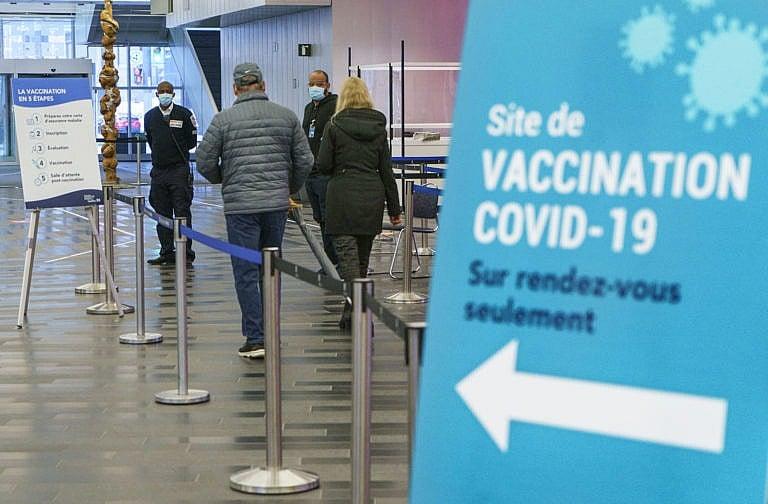Vaccine passports could facilitate a return to normal, says new report
Canada’s chief science advisor doesn’t recommend a specific approach, but warns that if governments don’t act soon the private sector may steam ahead

People walk into a COVID-19 vaccination clinic in Montreal, on April 15, 2021 (CP/Paul Chiasson)
Share
As other countries test out digital vaccination certificates and the international community scrambles to figure out post-pandemic travel, Canada’s chief science advisor has made public her first report on what COVID-19 “vaccine passports” could look like.
Dr. Mona Mener falls short of recommending a specific approach for using proof-of-vaccination certificates, but her report acknowledges that other countries are already much farther down the road, and suggests that “all levels of government” come up with a framework that would iron out the Canadian answers to several key questions that surround their use, both internationally and domestically.
Although Nemer’s capacity is to advise and not to act, experts who have clamoured for evidence that the feds are taking this seriously may be heartened by her analysis of scientific and ethical considerations, and her veiled warning that the private sector may steam ahead if governments don’t act soon.
“This is a rapidly advancing area and governments can play a role to develop effective policies and frameworks to protect the interests of all citizens before private companies implement ad hoc mandates for proof of vaccination,” the report reads.
It sets out that a framework would define who is considered fully “vaccinated,” taking into account Canada’s extended dosing intervals; provide “guidance” on data standardization, in line with international standards where possible; minimize “fraud, inappropriate use and potential negative impacts on vulnerable populations”; and maximize monitoring, research and epidemiologic data sharing, “all of which provide the essential scientific basis for the utility of vaccination certificates within and outside the healthcare context.”
The Nemer report doesn’t get any more detailed than that when it comes to implementing a system. But the devil really will be in the details. For one thing, good luck getting “all levels of government” to agree on anything in a timely manner, let alone what could constitute “potential negative impacts.” For another, good luck consolidating siloized Canadian health data with any level of coherent standardization.
The document tentatively suggests some benefits to a vaccine certificate system. “There could be interest in using vaccination certificates to permit safe travel between provinces, eliminate the need to quarantine, and protect remote and vulnerable communities,” it says.
For international travel, Canada will “undoubtedly need to coordinate with international organizations and partners,” the report states, coming close to admitting there is some inevitability to coming up with a system. International use would “facilitate travel to countries that demand proof of vaccination” and could undo some of the onerous requirements that are currently in place. “Current costs of travel related to testing and quarantine are significant. If vaccination certificates increase safety and ease some costs, this could be a significant benefit for Canadians, many of whom have been unable to visit their families within and outside Canada for some time.”
The report offers no opinion on domestic use other than stating that many people would like to “return to normal.” It simply states that vaccine certificates “could” be used for larger gatherings such as sporting events and festivals; and for a return to work, especially in higher-risk workplaces.
Nemer, whose work was informed by several meetings of an expert panel, does not box herself into any corners. There are myriad caveats to all of her assertions. And though the report offers a good lay of the land on scientific, ethical and legal issues, it offers few solutions.
On the scientific front, current evidence suggests that people who are fully vaccinated do have a decreased risk of spreading the disease, the report states. But several unknowns still complicate our understanding of the efficacy of vaccination passports. We need to better understand whether vaccinated people can transmit COVID-19, how long their immunity lasts and how protected they are from emerging variants.
On the ethical front, Nemer warns of a “haves” and “have nots” dynamic that could lead to “tensions among communities.” She warns that Indigenous, racialized and disadvantaged communities “may lack trust in established medical institutions and/or their governments due to historical harms,” and that a proof-of-vaccination system could exacerbate these. There is no specific mention of anti-vaxxers or vaccine hesitators, but the report offers that “while the anticipation of more freedom may be an incentive for some to get vaccinated, vaccine acceptance could decrease in others if there was a sense of coercion tied to using vaccination certificates.”
The report also notes that jurisdictional, privacy and authenticity issues could muddy the waters on a national system, and that any system will need to provide for alternatives, like negative tests, for those who are ineligible or unable to be vaccinated.
It’s hard to fault Nemer for hedging on how exactly to address all of these complexities. The report promised “scientific knowledge and considerations,” and it delivered. It’s now up to federal and provincial politicians—many of whom have not signalled detailed positions on the very concept of “vaccine passports”—to work together on the thorny issues Nemer has raised, and the national framework she loosely proposes. It’s up to them to do that soon, before they’re overtaken by a private sector eager to act. That’s if they manage to get to the table, at a time when they are focused on an uneven vaccine rollout and a massive third wave of cases. Big if.